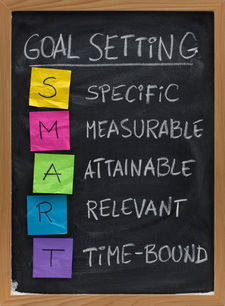|
Assuming you have established that exercising is of significant importance, how should you go about setting goals? The SMART goal approach, which stands for Specific, Measurable, Achievable, Realistic, and Timely (or Time Based) is one way of looking at the process of goal setting. Although I find some of these terms more useful than others, all five are relevant pieces of the goal-setting puzzle. Let’s take a closer look at each point and explore the strengths and limitations of each. Specific. The first term states that goals should be straightforward and that they should emphasise exactly what you want to happen. The idea is that the more specific the goal, the more you can focus your efforts and be clear about what you intend to do. For example, setting a goal to ‘do more exercise’ is vague and leaves a lot of room for interpretation and possible avoidance. A similar but far more specific goal might be to ‘go for a 30min walk straight after work every Wednesday and Friday.’ As you can see this second goal leaves little to chance as it clearly states the ‘what’ (a 30min walk) and the ‘when’ (straight after work on Wednesday and Friday). Limitations with specificity arise when your situation or thinking changes, which is often. What happens if you were to injure your foot, or Wednesday night is no longer a viable time to walk, or for that matter you decide you don’t actually like walking? Do you then set another goal? What flow on affect does this then have on the remaining terms of the SMART acronym? Measurable. The second term asserts that if you can’t measure it, you can’t manage it, or at least that management will be difficult. ‘Measurable’ means having concrete criteria in place for measuring progress toward each goal you set. The idea being when you can measure your goals you can see your progress which in turn helps you to stay on track and reach your targets.
This is of course affected by the first term ‘specific’, in that if your original goal isn’t specific then the chance it will be accurately measurable is low. For example measuring a goal of ‘I want to look better’ would be challenging at best, but change your goal to a more specific ‘I want to lose 5kgs in three months’ you then have something to work with. This all sounds good, but what if you set a goal that is difficult to measure? Say, for instance, you decide that you want to be able to play with your children for a reasonable amount of time without having to stop because of fatigue. How do you measure this? Where is the line in the sand where, on one side, you’re fatigued and on the other you’re not? The SMART protocol would say that your original goal needs to be more specific in order for it to be measured, but how do you quantify playing with your kids? Should you have to? The point is that you shouldn’t make a goal specific just so you can measure it. Measuring is great but don’t compromise your goals just so they can be measured. Achievable. The third term simply states that you must set goals that you have a reasonable chance of achieving. If a goal is too difficult, your motivation to achieve it will inevitably drop off once you realise how far out of your reach or capabilities it is. If it is too easy you may become bored and disinterested. A goal needs to be challenging enough to require a commitment, while still seeming achievable. For example, if you have been sedentary for a number of years and you set a goal ‘to exercise five times per week’, chances are you will struggle away until you become disheartened and quit. Whereas if you set a goal such as ‘go for a 30min walk after work every Wednesday and Friday’ then there is a much better chance you will stick with it. At first glance, an achievable goal seems like a sound concept. I mean, why would you set yourself a goal that you couldn’t achieve? No one likes to think they have failed, nor do they like dealing with the accompanying feelings of guilt, shame and worthlessness that come with failure. In saying that how do you know if a goal is achievable? Short term goals are one thing, but in a way all long term goals or lifestyle changes are a step into the unknown. If you cling too tightly to the need for your goals to be achievable are you doing yourself justice with the goals you set? Are you setting the bar high enough? Realistically there wouldn’t be too many people who have achieved every goal they have set out to achieve, but this is normal and expected. This doesn’t mean you should set the bar so high you can’t see it, however if something is of high importance to you and you really want to achieve it, why not aim high? Continued in part 2 For a different perspective and a look at a new and highly effective method of goal setting check out the '2-3-4 approach to change' here http://www.exercisechange.co.nz/resources.html
0 Comments
Leave a Reply. |
AuthorMatt Williams Archives
December 2015
Categories
All
|
|
Exercise Change© 2011-2022 ● [email protected] ● 021 107 1270 ● (int) +64 21 107 1270
|

 RSS Feed
RSS Feed
